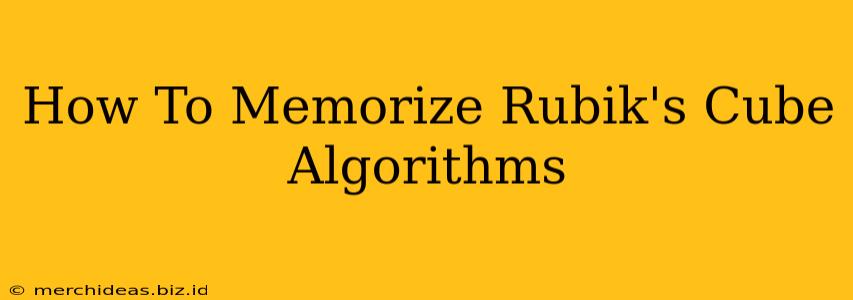So, you're ready to take your Rubik's Cube skills to the next level? Learning algorithms is the key, but memorizing them can feel overwhelming. Don't worry, this guide breaks down effective techniques to help you memorize those complex sequences with ease. We'll cover everything from understanding the algorithms themselves to employing powerful memory techniques. Let's get started!
Understanding Rubik's Cube Algorithms
Before diving into memorization, let's clarify what algorithms are. In the context of the Rubik's Cube, an algorithm is a sequence of moves that, when performed correctly, achieves a specific result. These moves are usually represented by a combination of letters and symbols (e.g., R U R' U'). These letters generally represent the faces of the cube (R for Right, L for Left, U for Up, D for Down, F for Front, B for Back). Understanding the notation is crucial for successful memorization.
Common Algorithm Notation:
- R: Rotate the right face 90 degrees clockwise.
- L: Rotate the left face 90 degrees clockwise.
- U: Rotate the up face 90 degrees clockwise.
- D: Rotate the down face 90 degrees clockwise.
- F: Rotate the front face 90 degrees clockwise.
- B: Rotate the back face 90 degrees clockwise.
- R', L', U', D', F', B': Rotate the respective face 90 degrees counter-clockwise.
Effective Memorization Techniques for Rubik's Cube Algorithms
Now that you understand the basics, let's explore proven methods for memorizing algorithms.
1. Chunking: Break it Down
Instead of trying to memorize a long algorithm all at once, break it into smaller, manageable chunks. For example, an algorithm like R U R' U' can be chunked into two parts: (R U) and (R' U'). This makes the sequence easier to grasp and recall.
2. Repetition and Practice: The Key to Mastery
Consistent repetition is essential for memorization. Practice the algorithm repeatedly, both visually and physically. Start slowly, focusing on accuracy. As your comfort level increases, gradually speed up your execution.
3. Visual Aids: See it to Believe it
Visualizing the algorithm's effect on the cube greatly enhances memorization. As you perform each move, observe how the pieces move and try to picture the entire sequence in your mind. Using a visual aid like a video tutorial can be very beneficial in this process.
4. Mnemonics: Creating Memorable Associations
Mnemonics are powerful tools for memorization. Create a memorable story or image associated with each algorithm. The more vivid and unusual your association, the easier it will be to remember. For example, you might create a silly story relating the algorithm moves to a sequence of actions.
5. Spaced Repetition: The Power of Timing
Don't try to cram all the algorithms at once. Use spaced repetition. Review algorithms at increasing intervals. This technique strengthens memory over time and improves long-term retention.
6. Use Flashcards or Apps: Technology to the Rescue
Numerous flashcards apps and websites are available to help with algorithm memorization. These tools can track your progress and provide spaced repetition schedules, optimizing your learning experience.
Tips for Success:
- Start with simple algorithms: Don't jump into complex sequences right away. Begin with beginner algorithms and gradually progress to more challenging ones.
- Understand the purpose of each algorithm: Knowing what a particular algorithm achieves will improve your understanding and enhance memorization.
- Be patient and persistent: Memorizing algorithms takes time and effort. Don't get discouraged if you don't see results immediately. Keep practicing, and you'll eventually succeed.
By following these techniques and dedicating consistent practice, you will successfully memorize Rubik's Cube algorithms and elevate your cube-solving skills to new heights. Remember, practice makes perfect!
